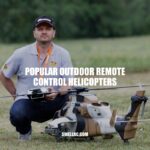Big Gas-Powered RC Planes: Thrilling Flights for Enthusiasts
Gas-powered RC planes have been around for many years and have become increasingly popular among remote control enthusiasts. These planes are powered by gasoline and can fly for extended periods, providing an enjoyable flight experience. The large size, big engines, and intricate details of gas-powered RC planes are sure to catch anyone’s eye. With proper care, these planes can last for years and offer a variety of exciting opportunities for people who are keen to take their RC hobby to the next level.
One of the main advantages of gas-powered RC planes is the extended flight time they offer. With their powerful engines, these models can fly for extended periods, making them ideal for RC enthusiasts who want to soar through the skies for as long as possible. Additionally, the added weight of the gas engine provides stability and control, making it easier to handle the aircraft. For those looking for a new challenge, gas-powered RC planes offer an exciting opportunity to upgrade from traditional electric models. They offer a more powerful and realistic flying experience that is hard to resist.
Factors to consider
RC enthusiasts should consider the following factors before investing in a gas-powered RC plane:
Engine size
- Bigger engines provide better acceleration and increased speed.
- However, bigger engines also mean higher fuel consumption and noise.
Design and features
- Choose a design that suits your preferences and skill level, whether it’s a replica of a military or an aerobatic airplane.
- Consider the features of the RC plane, such as flaps, landing gears, ailerons, rudders, and elevators. These can have a significant impact on the plane’s performance, stability, and control.
Assembly and maintenance
- RC enthusiasts should have patience, dedication, and investment in time and money for the proper assembly, maintenance, and care of their plane.
- Proper maintenance and care are essential for ensuring the plane’s longevity.
- Enthusiasts should have basic knowledge of RC parts, mechanics, and techniques before attempting assembly or maintenance.
Safety and regulations
- RC enthusiasts must observe safety rules and regulations, including flying in designated areas, avoiding flying near people or property, and observing proper flying techniques.
- Proper safety precautions such as wearing protective gear and ensuring aircraft compliance should always be kept in mind.
- It is crucial for enthusiasts to ensure they comply with regulations, such as registering their planes and sticking to the height and weight restrictions.
Overall, when it comes to gas-powered RC planes, enthusiasts must consider various factors before taking to the skies. Researching different websites that offer models, parts, and accessories can be beneficial in learning about the options available. Additionally, reading product reviews, watching tutorials, and attending events can provide useful insights into the hobby.
What are the cons of nitro or gas powered RC planes?
- They are noisy, which can be bothersome to people around you and even against noise regulations in certain areas.
- They require a lot of maintenance and upkeep, including regular cleaning and tuning.
- The fuel for these planes can be expensive and can require special handling and storage.
- They have more complex mechanics, which can make them more difficult to operate and troubleshoot.
If you are interested in learning more about RC planes or purchasing one, check out websites such as Horizon Hobby or Tower Hobbies.
Design and Features
The design and features of gas-powered RC planes are crucial in their performance and maneuverability. Here are some important factors to consider when choosing a gas-powered RC plane:
Size and weight
- Big-sized planes are more visible and have more sophisticated details.
- Lighter planes are easier to maneuver and require less power, but may not be as stable in windy conditions.
Wing configuration
- The most common wing types include high wing, mid-wing, and low wing.
- Each wing configuration has its advantages and disadvantages, such as stability, lift, and control.
- High-wing planes are generally more stable and easier to control, while low-wing planes offer better maneuverability and speed.
Power and control
- Power and control are essential factors in the design of gas-powered RC planes, including the size of the engine and the features such as flaps or spoilers.
- Flaps help to increase lift and reduce stall speed, while spoilers reduce lift, providing improved control during landing.
- Other features such as ailerons and elevators play a crucial role in the lateral and vertical control of the plane.
Popular models
Here are some of the popular gas-powered RC planes in the market today:
| Model | Wingspan | Engine size | Price |
|---|---|---|---|
| Hangar 9 P-51 Mustang | 65 inches | 15 cc | $599.99 |
| Great Planes Avistar Elite | 62.5 inches | 30 – 35 cc | $399.99 |
| Hobbico NexSTAR | 68 inches | 46 – 55 cc | $549.99 |
Overall, when choosing a gas-powered RC plane, the design and features are among the most critical factors to consider. RC enthusiasts can explore various websites that specialize in RC planes, such as Horizon Hobby, Tower Hobbies, and HobbyKing. With the right knowledge, research, and investment, the flying experience of a large, gas-powered RC plane is sure to be exhilarating.
What is the best fuel for RC planes?
The best fuel for RC planes is glow fuel, also known as nitro fuel. This type of fuel is a mixture of methanol, oil, and nitromethane. It gives off a distinctive blue flame and provides plenty of power for RC planes to perform tricks and stunts.
Some good options to consider for buying glow fuel are websites like Tower Hobbies, Horizon Hobby, and Amazon. It’s important to follow safety guidelines when handling RC fuels and store them in a cool, dry place.
Assembly and Maintenance
Building a gas-powered RC plane requires careful attention and knowledge of RC parts, mechanics, and techniques. Here are some key points to consider:
Assembly process
- RC kits come with detailed instructions, and there are plenty of online resources, such as videos and forums, to help.
- RC enthusiasts should follow the instructions closely, taking their time and double-checking connections and alignments.
- Starting with an ARF (Almost Ready to Fly) kit may be a good choice for beginners, as it requires less building and more assembly.
Maintenance tips
- RC planes require routine maintenance to keep them in good flying condition.
- Regularly cleaning the plane and its engine is essential to keep it running smoothly and prevent damage.
- RC enthusiasts should check for worn out or damaged components, such as bearings, fuel lines, or landing gears, and replace them if necessary.
- Proper storage, such as covering the plane or removing the battery, prevents damage from environmental factors or mishandling.
Popular websites to purchase and learn about RC planes
Here are some popular websites that provide useful information and resources for purchasing and learning about RC planes:
- Horizon Hobby offers a wide range of RC planes, parts, and tools, as well as articles, videos, and forums for RC enthusiasts.
- Tower Hobbies offers a large selection of RC planes, as well as tools, parts, and accessories, with customer reviews and support.
- HobbyKing offers affordable and diverse RC planes, as well as parts and tools, with free shipping on certain orders and a passionate community of RC enthusiasts.
In summary, building and maintaining a big gas-powered RC plane requires patience, dedication, and knowledge. RC enthusiasts can benefit from online resources, RC clubs, or local hobby shops. Regular maintenance ensures the plane is always in good working condition, preventing accidents or costly repairs.
What is Required to Fly RC Airplanes?
- An RC airplane
- A remote control
- A power source (batteries or fuel)
- A suitable flying location
- A basic understanding of how to operate and fly an RC airplane
For more detailed information on getting started with RC airplanes, check out websites such as Horizon Hobby or RC Groups. They have comprehensive guides, product reviews, and a community of experienced RC pilots who can offer advice and support.
Safety and Regulations
Flying big gas-powered RC planes involves certain risks and requires adherence to safety rules and regulations. Here are some key points to consider:
Safety precautions
- RC enthusiasts should always fly their planes in designated areas, such as a local RC club or a remote open field.
- They should avoid flying near people, animals, or property, and maintain a safe distance from structures, power lines, or trees.
- RC enthusiasts should always check their plane’s equipment, such as the battery, the fuel line, and the controls, before flying.
- It’s important to be aware of the surroundings and other flyers to avoid collisions or accidents.
- RC enthusiasts should always follow the manufacturer’s instructions, as well as general safety guidelines, such as avoiding flying in adverse weather conditions or at night.
Regulations
RC planes are subject to certain regulations, such as:
- Registering the plane with the FAA (Federal Aviation Administration) for drones weighing 0.55 to 55 pounds and flying for recreational or commercial purposes.
- Restrictions on where and how high the plane can fly, such as avoiding flying near airports or above 400 feet.
- Complying with local laws and regulations, such as noise ordinances or zoning laws.
- Having liability insurance for potential damage or injury caused by the plane.
Online resources for safety and regulations
Here are some useful online resources for safety guidelines and regulations:
- FAA Recreational Flyers and Modeler Community-Based Organizations: a page for guidelines and resources for RC flyers
- Know Before You Fly: a website that provides safety guidelines and educational resources for RC enthusiasts
- Academy of Model Aeronautics: a community-based organization for RC enthusiasts that offers safety programs, events, and information about flying sites and regulations
In summary, safety is paramount when flying big gas-powered RC planes, and adhering to regulations is necessary to avoid legal issues or accidents. RC enthusiasts should follow safety guidelines and check local regulations and laws before flying. Being knowledgeable about safety and regulations, as well as maintaining good flying etiquette, ensures a memorable and enjoyable RC experience for everyone.
What are the disadvantages of RC planes?
- Expensive initial investment
- High maintenance cost
- Difficult to learn how to fly
- Weather-dependent (difficult to fly in rain or wind)
- Limited flight time (battery life)
- Potential for crashes and damage to plane
If you’re looking for more information on RC planes, you might want to check out websites such as Horizon Hobby or Tower Hobbies for products and resources.
Conclusion
Big gas-powered RC planes are a thrilling hobby for RC enthusiasts who are passionate about aviation and technology. Their spectacular size and intricate details provide a unique experience that is sure to impress anyone. Whether you are a beginner or an expert in RC planes, there is always room for learning and improving. However, it’s important to keep in mind the safety guidelines and regulations, as well as respect other flyers and the environment. By following these principles, RC enthusiasts can continue to enjoy their hobby and share their passion with others.
Where to find gas-powered RC planes
If you are interested in purchasing a gas-powered RC plane, here are some options to consider:
- Horizon Hobby: a popular online retailer for RC planes, offering a range of gas-powered planes for beginners and advanced flyers
- Great Hobbies: a Canadian-based RC store that specializes in gas-powered planes and accessories
- Tower Hobbies: a global retailer that stocks a variety of gas-powered planes for different skill levels
No matter where you choose to buy your gas-powered RC plane, make sure to do your research, read reviews, and compare prices to get the best product for your needs. And most importantly, have fun flying and exploring the skies!



